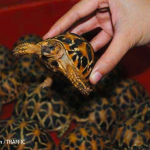By Dwi Adhiasto, Wildlife Conservation Society
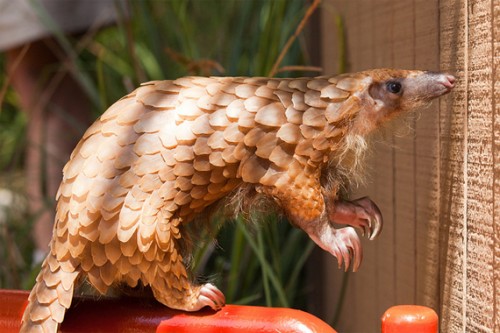
The current pressure on pangolins, slow lorises, tortoises and freshwater turtles epitomizes the need for greater protection of similarly rare and odd species. Just as tigers and elephants play vital ecological roles in their respective habitats, the countless smaller denizens provide essential services that may not be fully understood and appreciated until it is too late.
The pangolin is an extraordinary dog-sized animal that looks like it would have been well suited for the Mesozoic Era. Covered with a full coat of hard, overlapping scales, it is the only mammal to have evolved such a defense. When threatened, the pangolin curls up into a ball, much like the armadillo. It is mainly an insectivore, feeding in the manner of anteaters.
Yet taxonomically the pangolin is neither armadillo nor anteater. It belongs instead to Pholidota, a distinct order of mammals comprised of eight different species in Africa and Asia.
Sadly, these rare creatures are quietly sliding into extinction due to growing demand. Pangolins have likely been hunted for millennia—In Africa, the meat is highly sought and considered a delicacy—but the global illegal wildlife trade has escalated what was once a moderate harvest into an existential threat.
Pangolins don’t usually command the same attention as larger, charismatic species like tigers and elephants, but they, too, are being obliterated. In addition to their meat, there is demand for pangolin scales, considered to possess healing qualities by traditional Chinese medicine practitioners. The demand for pangolin products in Asian communities is so high that staggering numbers of pangolins are taken from the wild.
In Indonesia where I work with a dedicated Wildlife Conservation Society team, we recently helped law enforcement officials arrest and prosecute a ring of illegal traders who were shipping thousands of pangolins every year. At the time of their arrest they had over 2,000 frozen pangolins in their warehouse. We were fortunate to dismantle the trafficking network in this case, but the pangolin trade continues.
A recent study estimated that over the past 28 months 17,000 pangolins (most of them dead) were seized by law enforcement officials in several Asian countries. The total number trafficked over that period could be as high as 170,000 animals. As a consequence, several pangolin species are now listed as Endangered by the International Union for the Conservation of Nature (IUCN).
Pangolins are not the only obscure species that is impacted by the illegal wildlife trade. Some species are targeted because they have become popularized as pets. Such is the case with the slow loris, a diminutive primate found in Southeast Asia. The trade in slow loris has reached an alarming level. In 2012, our team in Indonesia found nearly 1,000 lorises being sold openly (and illegally) in markets in just four cities.
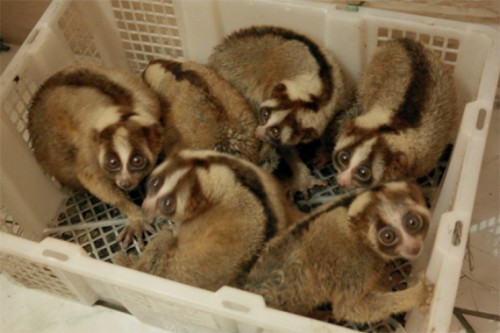
As a result of poaching from the wild, the slow loris has been listed on Appendix I of the Convention on the International Trade in Endangered Species of Wild Fauna and Flora (CITES), a convention that all countries in Asia have signed, and a designation that bans all international trade in the species.
But perhaps no group of animals has been harder hit than tortoises and freshwater turtles. The protective shells of these reptiles allowed them to survive for hundreds of millions of years. Unfortunately, they are no match for a veritable army of human hunters and collectors.
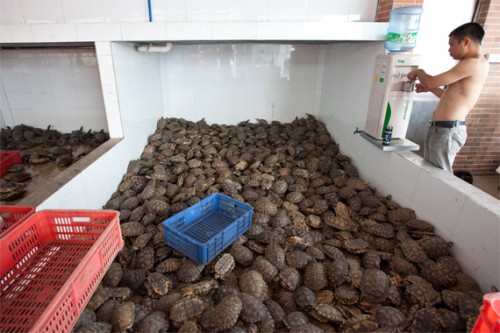
Recent studies estimate that more than half of the world’s tortoises and freshwater turtles are now facing extinction. Of those 200 threatened species, 32 are listed as Endangered and 44 as Critically Endangered on the IUCN Red List. Twenty-five of those species have fewer than 1,000 individuals remaining in the wild, according to a 2011 report by the Turtle Conservation Coalition.
Greater efforts to stem the tide in illegal wildlife trade would benefit all of these lesser-known victims. Stepping up enforcement in active wildlife trade hubs can help. An increased commitment from all countries in Southeast Asia, including Indonesia, would be of enormous help in protecting pangolins and other species from quietly slipping into extinction.
The Government of Indonesia is a member of the ASEAN-Wildlife Enforcement Network, under which there are special investigation groups set up to specifically tackle the trade in pangolins and other wildlife. Wildlife Conservation Society urges the Government of Indonesia to fully empower these special investigation groups so that they can arrest the major wildlife traders against which there is already incriminating evidence.
Dwi Adhiasto works on wildlife trade issues with the Wildlife Conservation Society’s Indonesia program.
| This article is licensed under a Creative Commons License. |


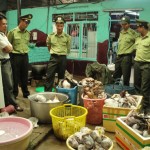

![470 Turtles Seized at Thai Airport, Smuggler Arrested [Photos]](https://annamiticus.com/wp-content/uploads/2013/11/8-11-13-TSEAa-150x150.jpg)
